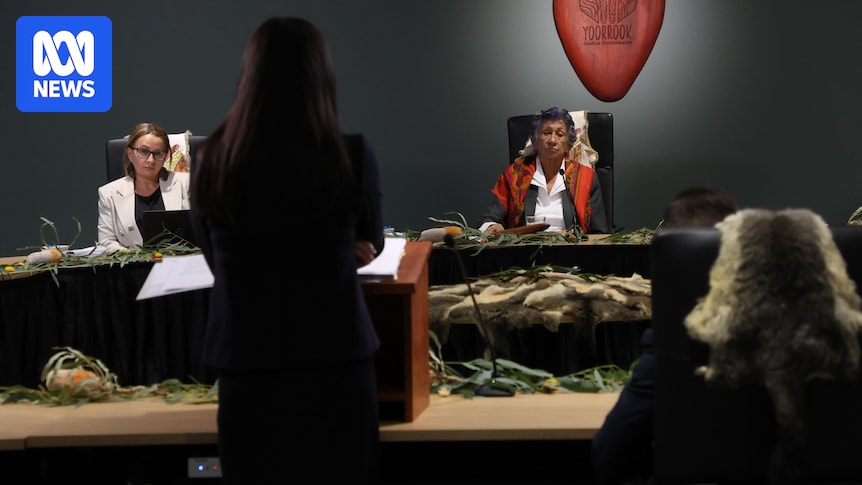Australia’s first formal truth-telling inquiry has found crimes against humanity and a genocide were committed against Aboriginal people in Victoria, and has recommended that Victorian First Peoples be compensated through treaties with interest.
The Yoorrook Justice Commission’s expansive final report was tabled in Victorian Parliament on Tuesday.
It made 100 recommendations based on the four-year, Aboriginal-led royal commission, which investigated past and ongoing impacts of colonisation in Victoria.
It found that serious crimes were committed during the colonisation of Victoria, including “mass killings, disease, sexual violence, exclusion, linguicide [the death of languages], cultural erasure, environmental degradation, child removal, absorption and assimilation”.
“This was genocide,”
the report said.
The inquiry has recommended the government use a treaty framework to “provide redress for injustice which has occurred during and as a result of the colonial invasion and occupation of First Peoples’ territories”.
That included redress for “all consequent damage and loss, including economic and non-economic loss for genocide, crimes against humanity and denial of freedoms” plus interest, and could also include initiatives like tax relief.
Among the other recommendations is a call for Victoria’s First Peoples’ Assembly to be made permanent and given decision-making powers.
The First Peoples’ Assembly is a democratically elected body that has existed in Victoria since 2018 and is currently tasked with negotiating a state-wide treaty in Victoria.
Ongoing truth-telling initiatives among recommendations
The inquiry has also recommended enhanced opportunities around land rights for First Nations groups in Victoria.
This could include redress in the form of land grants for the families of Aboriginal soldiers who were denied land parcels after fighting for Australia in World War I and World War II.
It could also include strengthening First Peoples’ rights to land through treaty, which could mean tax exemptions for First Peoples on natural resources, or transfers of rights or entitlements on Crown lands.
It also called for more markers and memorials that feature Aboriginal perspectives at places like massacre sites, and more Aboriginal place names.
Victorian Premier Jacinta Allan became the first leader of an Australian government to give evidence at an Indigenous-led truth-telling inquiry. (ABC News: Danielle Bonica)
The commission also called for ongoing truth-telling initiatives, including at universities, and more funding and oversight to ensure better health, housing and educational outcomes for Victoria’s First Peoples.
Since 2021, the Yoorrook Justice Commission has been tasked with investigating the past and ongoing impacts of colonisation in Victoria.
In its extraordinarily broad terms of reference, the commission was asked to investigate systemic injustices against First Peoples in order to make recommendations that addressed past wrongs and prevented them from happening again.
Running for more than four years until this week, it is now the longest state-run royal commission in Victoria, hearing from hundreds of witnesses over 67 days of public hearings.
Government’s previous commitment to permanent advisory body
As well as the final report with recommendations, Yoorrook also published an “official public record” of the history of Victoria since colonisation as told to the inquiry.
This report, which is separate to the five volumes including 100 recommendations, notes there was disagreement between some of the five Yoorrook commissioners about some findings included in that report.
As Yoorrook formally concluded on June 30, no spokesperson was available to give context on this disagreement and no former Yoorrook commissioners responded to the ABC’s requests for comment on Tuesday.
A spokesperson for the First Peoples’ Assembly told the ABC: “Every commissioner supported all the Yoorrook recommendations and findings and 14,000 Victorians voted with their feet on the Walk for Truth in support of truth-telling and Treaty.”
Co-chair of the First Peoples’ Assembly, Gunditjmara man Rueben Berg, said that Yoorrook’s final report makes the case for change.
“Victorians know that we can’t keep doing the same thing and expecting different results,”
he said.
“When it comes to issues facing First Peoples, we need a different approach, one that draws on the expertise of First Peoples to design and deliver practical solutions to local challenges. That’s what Treaty is all about.”
In a statement, Victorian Premier Jacinta Allan welcomed the release of the reports and said her government would consider the findings.
“Victoria’s truth-telling process is a historic opportunity to hear the stories of our past that have been buried — these are stories that all Victorians need to hear,” Ms Allan said.
In June, thousands joined the Walk for Truth as the truth-telling inquiry concluded. (ABC News: Danielle Bonica)
On Monday, Ms Allan indicated that she would support making the First Peoples’ Assembly a permanent advisory body.
“When you listen to people, you get better outcomes, and that’s what treaty is all about. I reckon we’re up for that as a state,” she said on Monday.
Meanwhile, the state’s Liberal opposition said on Monday it would not support making the Assembly permanent.
The opposition withdrew its support for Victoria’s treaty process, which is the most progressed of any Australian state or territory, in January last year.
The Yoorrook Justice Commission is the only formal Aboriginal truth-telling process in Australia, with truth-telling commitments in other Australian jurisdictions, like the Northern Territory and Queensland, scrapped.
